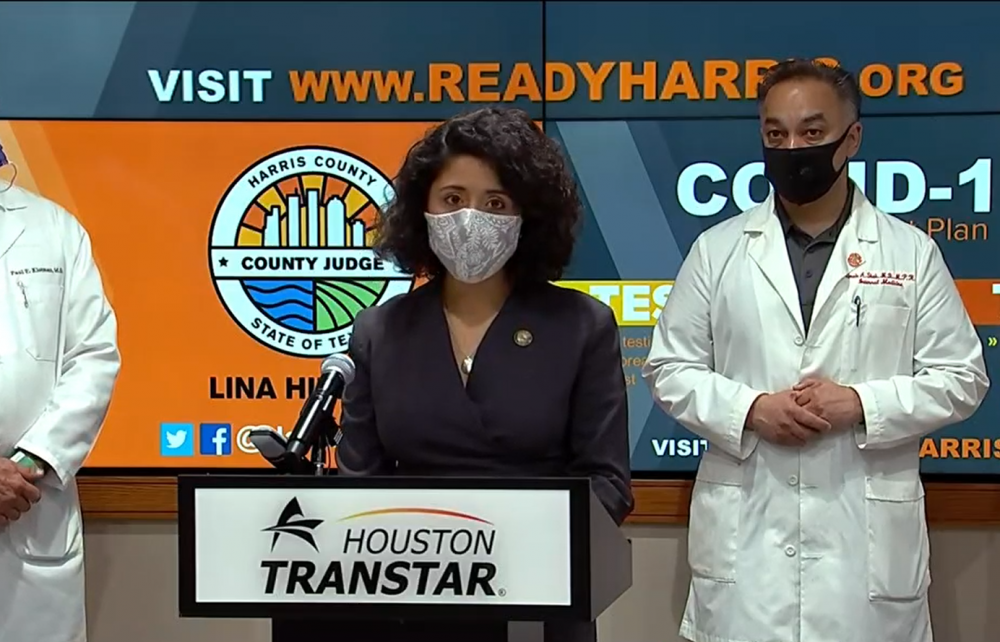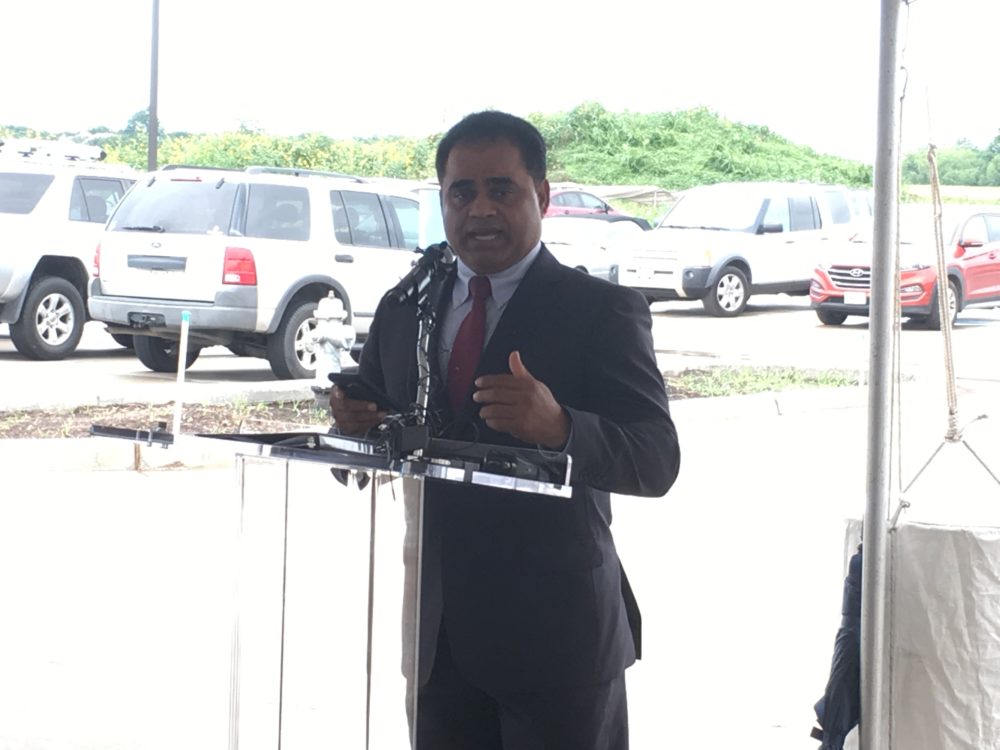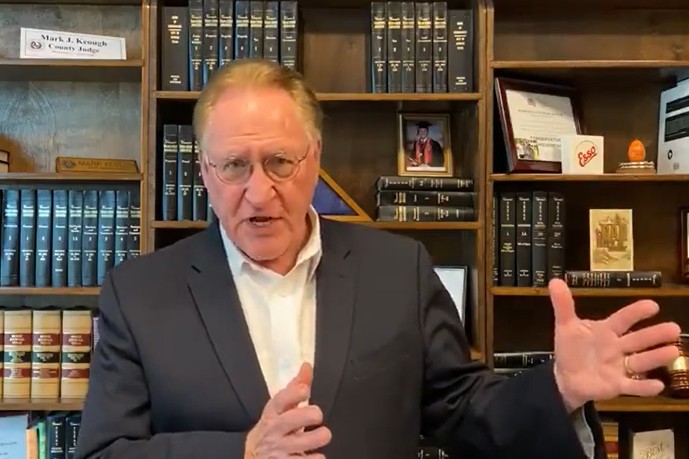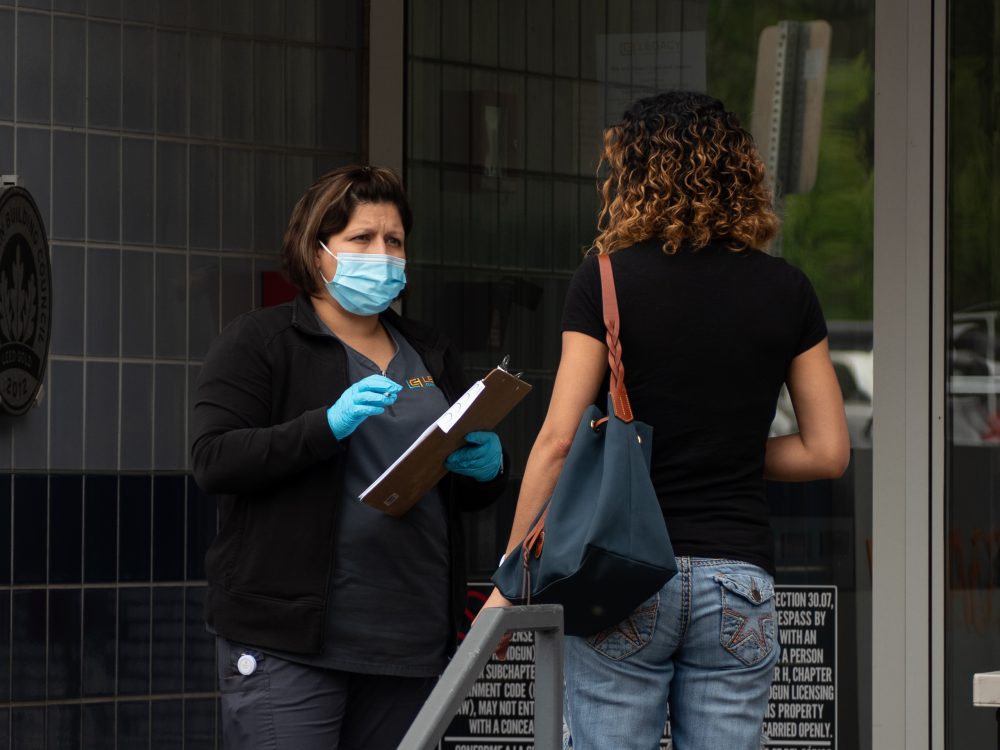This story is part of Houston Public Media's ongoing coronavirus coverage. To see our previous live coverage, click here.
Maps: Tracking COVID-19's Spread In Texas
Updated 11:54 p.m. CT Friday
As some restaurants and businesses planned to reopen at 25% capacity on Friday, Harris County Judge Lina Hidalgo urged those business owners not to rush, and asked people to continue staying home if possible to stop the spread of the coronavirus.
Hidalgo on Friday said that COVID-19 does not adhere to artificial timetables, and that the only way to stop the spread would be to continue following guidelines set by local governments, including “social distancing” at least six feet apart, and wearing mass in public if necessary to leave the hosue.
"Reopening doesn’t mean mission accomplished, it doesn’t mean the virus goes away," Hidalgo said.
"Just because you can open doesn’t mean you should," she said.
Hidalgo issued orders last month mandating most people stay indoors unless necessary, closing businesses and limiting service at restaurants and bars, and followed mandating face coverings for anyone who does leave the house.
But in an executive order issued this week, Gov. Greg Abbott superceded those directives, in part allowing restaurants to reopen at 25% capacity for sit-down dining service.
Abbott cited his own medical experts and a plateau of cases in the state in making his decision. But many health experts have cautioned against opening prematurely, and said doing so may only lead to a resurgence in COVID-19 cases.
On Thursday, Texas reported 50 more deaths from COVID-19, the most in any one day since mid-March. There were more than 1,000 new cases statewide, which was the biggest one-day jump in two weeks.
In Harris County alone, there were 97 new cases Thursday, outside of Houston, and one new death. In total, Harris County, including the city of Houston, has crossed 6,300 cases, according to Hidalgo.
Hidalgo specifically called out officials “making calls to ignore science, saying some amount of death is OK,” and said by ignoring guidelines like those laid out by the county, in favor of moving forward with opening the economy, there is a danger of a resurgence in positive cases, which could overwhelm the health care system.
"If these doctors and these nurses get overwhelmed, people die en masse,” Hidalgo said. “Plain and simple."
—
Updated 1:15 p.m. CT Thursday
—
Churches, synagogues and mosques can start to hold large gatherings under Gov. Greg Abbott’s plans to reopen Texas, but some churches have decided to keep services online, Houston Public Media’s Laura Isensee reports. Pastors and ministers from more than 80 Christian churches in greater Houston say they don’t feel it’s safe to worship in person in May, though they appreciate the governor recognizing their religious liberty. They’ve all signed a letter and indicate they have the support of leaders in the Texas Medical Center.
Still, other faith groups have decided to hold in-person service again. The Archdiocese of Galveston-Houston says individual parishes may choose to resume mass this weekend, as long as they follow safety guidelines, like limited capacity and strict cleaning.
—
—
Updated 12:54 p.m. CT Thursday
Fort Bend County Judge KP George has called on the state to remove a group of inmates transferred to a prison in Richmond who are recovering from COVID-19, and asking local residents to contacting their state representatives to take action.
George, who called the inmates “contagious,” said he was “shocked” to find out the Texas Department of Criminal Justice had transferred the men to the Beauford H. Jester I Unit.
“It's outrageous that state officials would jeopardize the health and safety of Fort Bend County citizens, who have sacrificed so much to flatten the curve, by sending all of their sick prisoners here," read a statement from George.
"I am not going to put our citizens at risk just as we begin to recover from the pandemic and reopen for business,” he said. “I demand that the State of Texas remove the contagious prisoners out of our County and transport them to another facility."
George said he contacted TDCJ for information on their prisoner transfer policy, was told “their policy is to round up all the COVID-19 prisoners from around the state and drive them all to the Jester 1 Unit.”
He also claimed the people transferred had not yet recovered.
But the state said the 35 prisoners were in recovery after being cleared from the hospital. The TDCJ also said the county judge was informed of the move on Friday, before inmates were moved over the weekend. According to TDCJ, Jester I was being used a “step-down facility,” and the people who had been transferred were the only ones quarantined inside the 200-person prison. Once they were fully recovered, they were set to be moved to other locations, according to TDCJ.
“We have to take into account the health and well-being of all of the offenders in our care,” a TDCJ spokesman said.
In total, 381 TDCJ employees and contractors have tested positive for COVID-19, while 1,050 incarcerated people in the TDCJ system have tested positive. Five employees and 12 prisoners are believed to have died as a result of COVID-19, according to the state. There are 14 deaths under investigation, pending autopsy results.
As of Thursday, 46 employees and 156 prisoners have recovered, according to the TDCJ website.
There are an additional 14 deaths that are under investigation and pending preliminary autopsy results. 2 other deaths that had been under investigation have been determined to be non-COVID-19 related after the return of preliminary autopsy reports. 19,598 offenders are on medical restriction because they may have had contact with either an employee or offender with a positive or pending COVID-19 test.
Thirty-seven facilities are currently under precautionary lockdown, including Jester I.
—
Updated 2:08 p.m. CT Wednesday
The city of Houston will open a new mobile coronavirus testing site in Sunnyside, a historically black neighborhood, as data continues to show that communities of color are the hardest hit by COVID-19.
The site, at Evan E. Worthing High School, was set to open Wednesday and would operate through May 3 from 9 a.m. to 5 p.m, or until it reaches a capacity of 150 people, Mayor Sylvester Turner said Wednesday.
"We have other COVID-19 testing sites across the city, and this one will bring vital COVID-19 testing resources closer to vulnerable communities," Turner said.
The mayor noted that the neighborhood was one of the hardest hit by COVID-19 in Houston, citing a Houston Chronicle analysis of cases across the city.
Local residents can register for an appointment at txcovidtest.org, or by calling 512-883-2400.
The mayor reported 96 new cases of COVID-19 in Houston, bringing the total to 3,515 inside city limits as of Wednesday, with two new deaths, which brings the total to 52.
—
Updated 12:01 p.m. CT Wednesday
Houston Mayor Sylvester Turner on Wednesday said he had spoken with the Montgomery County judge about his decision to open all businesses in the county, and argued that what happens in other parts of the region can also impact Houston.
The county judge, Mark Keough, said in a Facebook video posted Tuesday afternoon that Gov. Greg Abbott’s executive order — which lifted some regulations on businesses — was too vague, and that he would instruct all businesses to open in the county.
“If you open up in Montgomery County, OK, fully, bar, salons, you name it, people drive right down I-45 and come into the city of Houston,” Turner said. “And vice versa: people go from the city of Houston into MC.”
The first positive case of COVID-19 in the region was a Montgomery County man who worked as a security guard at the Houston Rodeo barbecue cook-off.
In his press conference announcing the order, Abbott specified that only retail, restaurants, movie theaters, malls and some museums and libraries could reopen, at 25% capacity. The Texas Department of Licensing and Regulation on Tuesday announced that “cosmetology salons (including nail salons, estheticians, and mini-salons), barber shops, laser hair removal establishments and massage establishments shall continue to remain closed,” citing Abbott’s order.
Keough was not the only politician who pushed for the reopening of more businesses. Briscoe Cain called on businesses across Texas to defy the order.
https://twitter.com/BriscoeCain/status/1255507145812049930?s=20
—
Updated 5:27 p.m. CT Tuesday
—
Harris County leaders voted to create a $15 million COVID-19 relief fund to aid residents who are ineligible to receive federal assistance. The vote was 3-2 along party lines. The fund would be managed by the Greater Houston Community Foundation and the United Way. Commissioner Rodney Ellis, who sponsored the measure, said he intended for it to aid undocumented immigrants and their families, as well as the poorest of the poor.
There are an estimated 500,000 undocumented immigrants who live in Houston alone, none of which are currently eligible for federal stimulus aid or unemployment, even as COVID-19 leads to skyrocketing unemployment.
—
Updated 3:48 p.m. CT Tuesday
Montgomery County Judge Mark Keough on Tuesday said he was preparing to reopen all businesses in the county, saying Gov. Greg Abbott's executive order lifting only some restrictions on business was too vague.
Keough complained that the order, signed Monday by Gov. Greg Abbott, was stifling businesses by only allowing them to open at 25% occupancy, and said the governor was picking "winners and losers" by setting limits on which businesses were allowed to open.
As part of his argument, Keough questioned why dentists were now allowed to open and not hair salons, even though dentists performing oral surgery and routine check-ups for dental hygiene put their hands inside of patients' mouths.
"Here's a guy, as a dentist, has his hands in your mouth, for maybe two-three hours, maybe only a half-hour, but the fact of the matter is, now we have closed hair salons, who would take 15 minutes to a half-hour to cut your hair, and we keep them closed, and then we turn around and let these other guys be open when it's much more intimate and invasive," Keough said in a Facebook video. "See I have a problem with that as your county judge."
When the governor's existing order ends Friday, Keough said the county's enforcement ability would be limited due to the perceived vagueness, and that he would refuse to keep any businesses closed.
Keough said he would do so unless the governor clarified whether certain other businesses like hair salons could open.
"The businesses that he said would be closed are not in his orders as closed,” Keough said. “He just says ‘advise people to stay away from certain businesses.’ It is unclear, it is vague, and like a number of things that have come out recently, are very inconsistent."
At his press conference Monday Abbott told reporters only retail, restaurants, movie theaters and malls can reopen at limited capacity starting Friday. Museums and libraries could also reopen, but hands-on exhibits must remain closed, Abbott said.
When asked at the press conference about salons, Abbott did say they must remain closed until at least May 18, per his order.
It's not the first time Keough has bristled at tight restrictions during the COVID-19 pandemic. Keough in March said he would not issue a stay-at-home order in Montgomery County, arguing such an order would infringe on individual liberties.
"To add an additional order on top of that to potentially restrict us and more of our freedoms? That's not what we're doing here in Montgomery County," Keough said at the time.
Two days later, Keough reversed course and issued a stay-at-home order for the county.
—
Updated 10:45 a.m. CT Tuesday
The Texas Supreme Court on Monday evening extended a moratorium on evictions until May 18, giving renters additional breathing room as the coronavirus pandemic leads to skyrocketing unemployment and financial instability in the region. The original order was set to expire Thursday.
Landlords can still notify tenants of their intention to evict in the future, but the courts can not proceed with the eviction process while the moratorium is in place.
Texas cities like Austin and Dallas have further extended renter protections by passing a 60-day grace period. Houston has not passed any additional relief for renters.
In both Austin and Dallas, landlords have to send a “notice of proposed eviction” before beginning the eviction process. After that notice is issued, a renter has 60 days to either catch up on rent or work out a payment plan with the landlord.
Some Houston City Council members, like At-Large 5 Council Member Letitia Plummer, have discussed passing a similar measure. But Plummer said she was informed by City Attorney Ron Lewis that the City isn't allowed to pass an ordinance like the one in Austin.
Some legal experts disagree. Heather Way, a professor at the University of Texas at Austin Law School, said Texas cities are empowered to create a grace period for renters.
"I believe what Austin and Dallas have done is in the confines of the law and within their powers," Way said. "Cities do have limited powers in terms of regulating the landlord-tenant relationship, and this is one of the few things that I feel like they do have the power to do."
—
Harris County Judge Lina Hidalgo on Tuesday said containing the spread of COVID-19 would be a “tall order” given the governor’s imposed May 1 reopening of certain nonessential businesses.
Hidalgo, who called Harris County the “epicenter” of the coronavirus in Texas, said she was also eager to restart the local economy by lifting certain restrictions on businesses. But, she added, the community “can’t take eye off the ball,” and recommended sticking to guidelines already put in place.
“If we are not smart in the way we do this, we risk a spike, or at worse, a second surge higher than the first one like we’ve seen in other countries,” Hidalgo said. “And we risk having to go back to where we started, and we risk losing all of the profound sacrifices that people have made to get us to this point.”
The county judge made her comments at a press conference Tuesday morning announcing plans for the county's new contact tracing program. While she said the spread of COVID-19 was beginning to level off, the county needed to ramp up testing, tracing, and treatment to keep it that way.
Harris County now has the capacity to test 1,600 people a day, and is hiring 300 additional contact tracers — public health workers who can track down each person possibly exposed to someone with the coronavirus, and have them self-quarantine. Harris County's also rolled out a so-called "strike team" to administer tests in nursing homes.
The judge said the curve of hospital admission has still not decreased to the safest level recommended by experts, but continued social distancing and contact tracing will keep hospitals from becoming overcrowded. The county's shooting for less than 100 new cases of COVID-19 per day in order to do that.
—
Updated 3:59 p.m. CT Monday
The state of Texas will begin lifting restrictions placed on businesses to help stop the spread of the coronvirus this week, Gov. Greg Abbott said Monday.
In what Abbott called “phase one” of the “reopening” of Texas’ economy, all retail, restaurants, movie theaters and malls can reopen at 25% capacity starting Friday. Museums and libraries can also reopen, but hands-on exhibits must remain closed, Abbott said.
"Every life lost is a tragedy, but the fact is the tragedies in Texas have been far fewer than most states in the United States," Abbott said. “The lives saved are priceless, but the price has been steep. Many have lost jobs, others have lost businesses.”
As part of the order, religious institutions can also expand capacity on Friday, and outdoor sports will be allowed to continue, so long as they involve no more than four participants at any given time, and involve social distancing, like golf and tennis. All licensed health care professionals are allowed to return to work with fewer restrictions, but hospitals must still reserve 15% of capacity for COVID-19 patients.
There are different standards for smaller counties. Those with five or fewer confirmed cases of COVID-19 will have all restrictions lifted on May 1, Abbott said.
A second phase, which opens more businesses and allows for more sporting activities, could come as early as May 18, pending more than two weeks of medical data to confirm no “flare-ups”, the governor said.
—
Updated 2:20 p.m. CT Monday
Harris County Judge Lina Hidalgo has announced plans to increase testing in the county. A recently formed “strike team” consisting of epidemiologists, public health experts, social workers and testing staff will start traveling to nursing homes around the city to test residents and staff, starting with one nursing home a day and prioritizing those with cases. The teams will conduct site assessments, provide recommendations and test large groups of residents and staff.
Public health experts say a quarter of all deaths in Texas are somehow linked to nursing facilities.
The county also announced two new testing sites, in the Tomball area and in southeast Houston. The sites will begin operation later this week.
—
Harris County officials are facing the likelihood that COVID-19 will still be a threat when the primary runoff election takes place in July. Now those officials are working on ways to keep those voters safe.
County Clerk Diane Trautman will ask Harris County Commissioners Court for a potential expansion of the vote-by-mail program due to COVID-19. Trautman previously told Houston Public Media that the county was not in a position to adopt a universal all-mail ballot program. She noted that states that have such a program took years to plan for it and have fewer registered voters than Harris County.
Trautman said that expanding the county's mail ballot program will require additional funds for postage, printing, additional staff, voter education, and infrastructure.
Meanwhile, a lawsuit continues to work its way through the courts calling on the state to allow anyone who wishes to vote by mail during the pandemic to do so. Harris County has filed a court brief in support of that suit.
—
—
Gov. Greg Abbott on Monday was set to announce plans to lift restrictions on Texas businesses and “reopen” the Texas economy, even as public health experts stress there is more to be done before moving forward with such a plan.
Earlier this month, Abbott announced his plans to gradually reopen aspects of the state's economy, putting together what he called a "strike force" to advise on the steps needed to do so. The governor issued an executive order allowing allowing "retail-to-go" services, similar to restaurant service during the statewide stay-at-home order, opened state parks, and loosened some restrictions on surgeries.
The governor at that time set April 27 as the next phase in that reopening, announcing the further loosening of restrictions at that time.
The order, he said, would supersede any existing local orders from county or city officials. Mayor Sylvester Turner on Friday seemed to confirm that, saying any order from Abbott would "trump — let me put it that way — local government orders."
Harris County Judge Lina Hidalgo was awaiting Abbott’s announcement before deciding whether to move forward on extending her own stay-at-home order, a spokesperson from her office said Monday.
Experts have urged caution on lifting restrictions until there is significantly more testing and contact tracing — a method of identifying who a patient that’s tested positive for COVID-19 has come into close contact with in recent weeks, in order to better understand the spread of the virus and warn others about their possible exposure.
Some public health officials, meanwhile, are worried that lifting those restrictions will roll back much of the work already done by local communities.
“The lag in this virus is two weeks,” Harris County Public Health Executive Director Umair Shah told Houston Matters on Monday. “My concern is that as we open up and people start to mix back together, are we looking at an increase in surge a couple of weeks from now, that we’ve not seen thus far? And that is the unknown that continues to keep me concerned.”
Harris County issued its stay-at-home order on March 24, a full week before Abbott’s statewide order. And local orders like Harris County’s recent requirement to wear masks in public, effective Monday, were put in place out of an abundance of caution, Shah and other have said.
No matter what restrictions are lifted, Shah said, Harris County residents should continue to take those protective measures — facial coverings, social distancing — to avoid a potential surge in cases.
“Life as we know it has changed,” he said. “Four months ago, or six months ago, or a year ago, we are not going to reopen back to that point. We are not going to be able to go back to life as we know it. It is a new normal.”

 76 °F
76 °F


